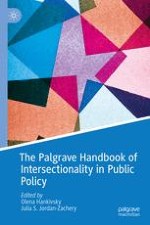2019 | OriginalPaper | Buchkapitel
16. Scaling Educational Policy and Practice Intersectionally: Historical and Contemporary Cases from South and Southeast Asia
verfasst von : Mayurakshi Chaudhuri, Viola Thimm, Sarah J. Mahler
Erschienen in: The Palgrave Handbook of Intersectionality in Public Policy
Verlag: Springer International Publishing
Aktivieren Sie unsere intelligente Suche, um passende Fachinhalte oder Patente zu finden.
Wählen Sie Textabschnitte aus um mit Künstlicher Intelligenz passenden Patente zu finden. powered by
Markieren Sie Textabschnitte, um KI-gestützt weitere passende Inhalte zu finden. powered by
